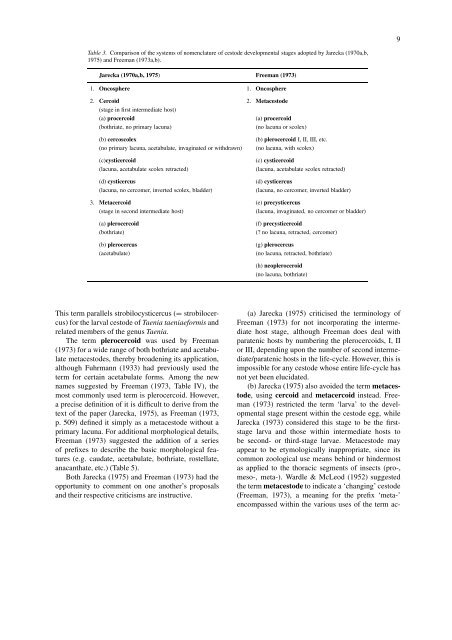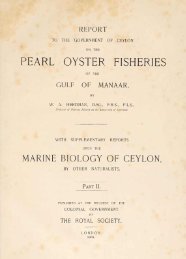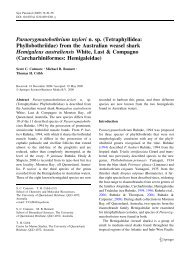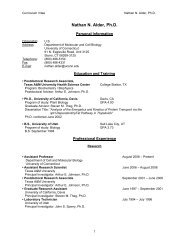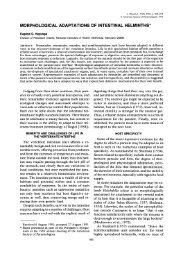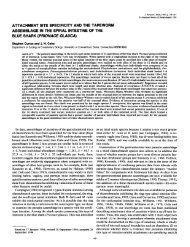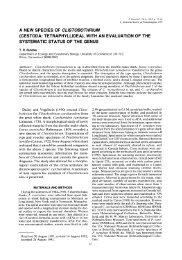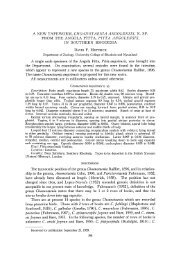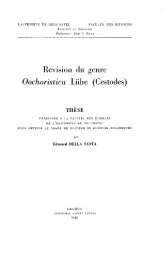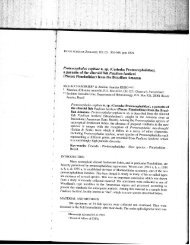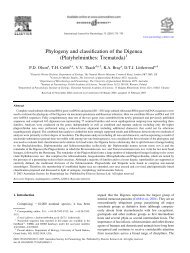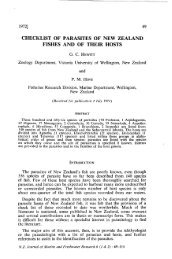8Jarecka and FreemanTwo additional systems <strong>of</strong> <strong>larval</strong> cestode <strong>terminology</strong>were developed essentially contemp<strong>or</strong>aneously(Jarecka, 1970a,b, 1975; Freeman, 1973) and sharea common feature, derived from Moniez (1880) andVillot (1883), namely that features observable duringdevelopment, particularly the presence <strong>or</strong> absence <strong>of</strong>a cercomer and a primary lacuna are given considerablesignificance. Beyond this commonality, theydiffer in that the system <strong>of</strong> Freeman (1973) subsequentlyrelied on <strong>larval</strong> cestode m<strong>or</strong>phology alone,while that <strong>of</strong> Jarecka (1975) inc<strong>or</strong>p<strong>or</strong>ated, as a feature,whether the cestode larva occurred in its first <strong>or</strong> secondintermediate host (Table 3).In the system proposed by Jarecka (1970a,b,1975), <strong>larval</strong> <strong>cestodes</strong> in the first intermediate hostwere termed cercoids, while those in a second intermediatehost were termed metacercoids. Cercoidscould possess a cercomer, but, by definition, metacercoidslacked a cercomer. Cercoids were sub-dividedinto the: (1) procercoid, which is bothriate but lacksa primary lacuna (gymnosomic in the <strong>terminology</strong><strong>of</strong> Jarecka, 1975); (2) cercoscolex, which is acetabulate,lacks a primary lacuna and has a withdrawn<strong>or</strong> retracted scolex (= Gryp<strong>or</strong>hynchus <strong>of</strong> earlier auth<strong>or</strong>s);(3) cysticercoid, which has a primary lacuna(cystosomic in the <strong>terminology</strong> <strong>of</strong> Jarecka, 1975), isacetabulate and has a withdrawn scolex; and (4) cysticercus,which is acetabulate, invaginated and lacks acercomer. <strong>The</strong> metacercoid, in the second intermediatehost, lacks a cercomer and may be either a bothriateplerocercoid <strong>or</strong> an acetabulate plerocercus. <strong>The</strong>system <strong>of</strong> <strong>terminology</strong> proposed by Jarecka (1970a,b,1975) thus retains the traditional terms cysticercus,cysticercoid and plerocercoid. Procercoid was <strong>or</strong>iginallyapplied to the caudate (= with cercomer) stages<strong>of</strong> pseudophyllideans in the first intermediate hostpri<strong>or</strong> to development <strong>of</strong> the bothria (Janicki & Rosen,1917). <strong>The</strong> re-definition <strong>of</strong> the term by Jarecka (1975)meant that it also included the caudate, bothriate <strong>larval</strong><strong>cestodes</strong> <strong>of</strong> caryophyllideans and overcame theanomaly, f<strong>or</strong> pseudophyllideans, <strong>of</strong> development ineither two intermediate hosts (e.g. Diphyllobothrium,Ligula; see Janicki & Rosen, 1917; Rosen 1920) <strong>or</strong>a single intermediate host (e.g. Bothriocephalus; seeRobert et al. 1988; Scholz, 1997). Her term ‘cercoscolex’described proteocephalidean meta<strong>cestodes</strong>(Scholz, 1997) as well as those <strong>of</strong> the family Gryp<strong>or</strong>hynchidae.<strong>The</strong> term plerocercus, previously appliedto trypan<strong>or</strong>hynch meta<strong>cestodes</strong> retracted withina bladder-like cysts (Dollfus, 1942), was used f<strong>or</strong>unspecified acetabulate <strong>cestodes</strong> in the second intermediatehost. Under her system, trypan<strong>or</strong>hynchanmeta<strong>cestodes</strong> would have been termed plerocercoids.A subsequent modification <strong>of</strong> this system was proposedby Gulyaev (1997a) to include presumed stagesin the evolution <strong>of</strong> <strong>larval</strong> <strong>cestodes</strong>, in which Spasskii’s(1951) term amphicyst, f<strong>or</strong> linstowiid meta<strong>cestodes</strong>,was added to the range <strong>of</strong> cercoids, tetrathyridiumwas added to the range <strong>of</strong> metacercoids and theterm plerocercoid was replaced by blastocyst f<strong>or</strong> trypan<strong>or</strong>hynchmeta<strong>cestodes</strong> (Table 4). Gulyaev (1997a)introduced two additional terms (Table 4), protolarvaf<strong>or</strong> meta<strong>cestodes</strong> lacking a primary lacuna and larvacystoidsf<strong>or</strong> meta<strong>cestodes</strong> lacking a cercomer <strong>or</strong>bladder, but retained the term larvacyst (= larvicyst)<strong>of</strong> Skrjabin (1937) f<strong>or</strong> cysticercoids, cysticerci and theblastocysts <strong>of</strong> trypan<strong>or</strong>hynchs.<strong>The</strong> system utilised by Freeman (1973) (Table 3)differed in that, while inc<strong>or</strong>p<strong>or</strong>ating the absence <strong>or</strong>presence <strong>of</strong> a primary lacuna (termed ‘primitive’and ‘neoteric’, respectively) and the presence <strong>or</strong> absence<strong>of</strong> a cercomer, the number <strong>of</strong> intermediate hostswas essentially disregarded and the m<strong>or</strong>phology <strong>of</strong>the <strong>larval</strong> cestode only was considered. In Freeman’ssystem (1973), the traditional terms procercoid, cysticercus,cysticercoid and plerocercus were retained.Several new terms were used by Freeman (1973). Precysticercuswas coined f<strong>or</strong> meta<strong>cestodes</strong> without acercomer, with a primary lacuna and in which thescolex was invaginated (e.g. Linstowiidae). This termis synonymous with amphicyst <strong>of</strong> Spasskii (1951)and Gulyaev (1997a). <strong>The</strong> term neoplerocercoid wascoined f<strong>or</strong> trypan<strong>or</strong>hynch meta<strong>cestodes</strong> lacking a blastocyst(Freeman, 1973, p. 511), currently allocated tothe sub<strong>or</strong>der Homeacanthoidea by Campbell & Beveridge(1994). However, Freeman (1973, p. 521) alsosuggested that the same term, neoplerocercoid (pp.521, 528-9), could be applied to anoplocephalid andhymenolepidid meta<strong>cestodes</strong> based upon the development<strong>of</strong> the scolex from the ‘f<strong>or</strong>e body’ (p. 521) andlacking a cercomer in their fully-developed f<strong>or</strong>m. Itmay be that Freeman intended to use the term neoplerocercusf<strong>or</strong> trypan<strong>or</strong>hynchs and neoplercercoidf<strong>or</strong> cyclophyllideans, but that there are typographicalerr<strong>or</strong>s in the published paper. Freeman’s term postplerocercoidwas coined f<strong>or</strong> <strong>larval</strong> <strong>cestodes</strong> such as those<strong>of</strong> Ligula, in which evidence <strong>of</strong> segmentation is apparentin the <strong>larval</strong> stage. <strong>The</strong> other term coined by Freeman(1973) was strobilocysticercoid f<strong>or</strong> Laterip<strong>or</strong>us,in which segmentation is present in the <strong>larval</strong> cestode.
9Table 3. Comparison <strong>of</strong> the systems <strong>of</strong> nomenclature <strong>of</strong> cestode developmental stages adopted by Jarecka (1970a,b,1975) and Freeman (1973a,b).Jarecka (1970a,b, 1975) Freeman (1973)1. Oncosphere 1. Oncosphere2. Cercoid 2. Metacestode(stage in first intermediate host)(a) procercoid(a) procercoid(bothriate, no primary lacuna)(no lacuna <strong>or</strong> scolex)(b) cercoscolex(no primary lacuna, acetabulate, invaginated <strong>or</strong> withdrawn)(c)cysticercoid(lacuna, acetabulate scolex retracted)(d) cysticercus(lacuna, no cercomer, inverted scolex, bladder)(b) plerocercoid I, II, III, etc.(no lacuna, with scolex)(c) cysticercoid(lacuna, acetabulate scolex retracted)(d) cysticercus(lacuna, no cercomer, inverted bladder)3. Metacercoid (e) precysticercus(stage in second intermediate host)(lacuna, invaginated, no cercomer <strong>or</strong> bladder)(a) plerocercoid(bothriate)(b) plerocercus(acetabulate)(f) precysticercoid(? no lacuna, retracted, cercomer)(g) plerocercus(no lacuna, retracted, bothriate)(h) neopleroceroid(no lacuna, bothriate)This term parallels strobilocysticercus (= strobilocercus)f<strong>or</strong> the <strong>larval</strong> cestode <strong>of</strong> Taenia taeniaef<strong>or</strong>mis andrelated members <strong>of</strong> the genus Taenia.<strong>The</strong> term plerocercoid was used by Freeman(1973) f<strong>or</strong> a wide range <strong>of</strong> both bothriate and acetabulatemeta<strong>cestodes</strong>, thereby broadening its application,although Fuhrmann (1933) had previously used theterm f<strong>or</strong> certain acetabulate f<strong>or</strong>ms. Among the newnames suggested by Freeman (1973, Table IV), themost commonly used term is plerocercoid. However,a precise definition <strong>of</strong> it is difficult to derive from thetext <strong>of</strong> the paper (Jarecka, 1975), as Freeman (1973,p. 509) defined it simply as a metacestode without aprimary lacuna. F<strong>or</strong> additional m<strong>or</strong>phological details,Freeman (1973) suggested the addition <strong>of</strong> a series<strong>of</strong> prefixes to describe the basic m<strong>or</strong>phological features(e.g. caudate, acetabulate, bothriate, rostellate,anacanthate, etc.) (Table 5).Both Jarecka (1975) and Freeman (1973) had theopp<strong>or</strong>tunity to comment on one another’s proposalsand their respective criticisms are instructive.(a) Jarecka (1975) criticised the <strong>terminology</strong> <strong>of</strong>Freeman (1973) f<strong>or</strong> not inc<strong>or</strong>p<strong>or</strong>ating the intermediatehost stage, although Freeman does deal withparatenic hosts by numbering the plerocercoids, I, II<strong>or</strong> III, depending upon the number <strong>of</strong> second intermediate/paratenichosts in the life-cycle. However, this isimpossible f<strong>or</strong> any cestode whose entire life-cycle hasnot yet been elucidated.(b) Jarecka (1975) also avoided the term metacestode,using cercoid and metacercoid instead. Freeman(1973) restricted the term ‘larva’ to the developmentalstage present within the cestode egg, whileJarecka (1973) considered this stage to be the firststagelarva and those within intermediate hosts tobe second- <strong>or</strong> third-stage larvae. Metacestode mayappear to be etymologically inappropriate, since itscommon zoological use means behind <strong>or</strong> hindermostas applied to the th<strong>or</strong>acic segments <strong>of</strong> insects (pro-,meso-, meta-). Wardle & McLeod (1952) suggestedthe term metacestode to indicate a ‘changing’ cestode(Freeman, 1973), a meaning f<strong>or</strong> the prefix ‘meta-’encompassed within the various uses <strong>of</strong> the term ac-


